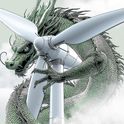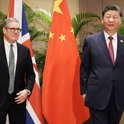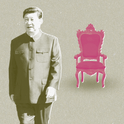(Above) Music lessons with Amy Chua: "If the next time’s not PERFECT, I’m going to TAKE ALL YOUR STUFFED ANIMALS AND BURN THEM"
There is nothing quite so insufferable as advice about how to raise one’s children—unless it is advice about how to raise one’s children from the Chinese. Sure, the Chinese have trounced the west in the global financial crisis, and might just rule the world by the time that today’s western children are grown—but the west still “does” childhood better than the Chinese do, right? Perhaps not. Amy Chua, a professor of law at Yale and second generation Chinese-American, thinks it is time the west had a crisis of conscience about its parenting techniques, to go along with its banking and credit crises. Her new book, Battle Hymn of the Tiger Mother (Bloomsbury) argues that we could all spawn violin-wielding maths wizards—of the kind that delivered the Chinese economic miracle—if we would just learn to parent like the Chinese. Her book landed on my desk as I was wondering whether my own parenting would ever produce children capable of delivering an economic miracle (like repaying their college debt). I was reading it when my two girls, aged nine and 11, came home from their bilingual international school in Shanghai, clutching report cards full of grades that Chua would have considered a disgrace to Chinese parenting. Since my (adopted) children are arguably more Chinese than Chua—having been born on the mainland, and lived in China for a big chunk of their short lives—their failure to demonstrate the academic excellence so closely associated with their ethnicity can surely have only one cause: my faulty western parenting. Their biological parents would doubtless agree: they would consider me certifiable if they knew that my primary goal has been to raise happy children, not successful ones. The orphanage official who named one of my foundling daughters Xinke—or “does well in the Imperial examinations”—presumably had something in mind for her beyond contentment. Best not to tell them that I consider academic success inimical to childhood happiness (and irrelevant to contentment in later life). I graduated number two in my American high school class, so I know the price paid for top marks; I prefer to raise homecoming queens. Or so I thought, until that last report card: even homecoming queens have to pass secondary school. Suddenly the notion of a spot of Chinese parenting sounded more appealing. And if anyone could sell me on a paradigm shift in my parenting, Chua is the person: her book is funny and beautifully written—if sometimes only marginally sane—and intelligently provocative. It made me think twice about whether to become a Chinese Mum after all.
The pillars of Chinese parenting (according to Amy Chua) “Chinese parents can do things that would seem unimaginable—even legally actionable—to westerners.” “As a parent, one of the worst things you can do for your child’s self-esteem is to let them give up.” “The Chinese mother believes that: 1 Schoolwork always comes first 2 An A-minus is a bad grade 3 Your children must be two years ahead of their classmates in maths 4 You must never compliment your children in public 5 If your child ever disagrees with a teacher or coach, you must always take the side of the teacher or coach 6 The only activities your children should be permitted to do are those in which they can eventually win a medal 7 That medal must be gold” “Here are three things I actually said to (my daughter) at the piano as I supervised her practising: 1 Oh my God, you’re just getting worse and worse. 2 I’m going to count to three, then I want musicality! 3 If the next time’s not PERFECT, I’m going to TAKE ALL YOUR STUFFED ANIMALS AND BURN THEM”
There is nothing quite so insufferable as advice about how to raise one’s children—unless it is advice about how to raise one’s children from the Chinese. Sure, the Chinese have trounced the west in the global financial crisis, and might just rule the world by the time that today’s western children are grown—but the west still “does” childhood better than the Chinese do, right? Perhaps not. Amy Chua, a professor of law at Yale and second generation Chinese-American, thinks it is time the west had a crisis of conscience about its parenting techniques, to go along with its banking and credit crises. Her new book, Battle Hymn of the Tiger Mother (Bloomsbury) argues that we could all spawn violin-wielding maths wizards—of the kind that delivered the Chinese economic miracle—if we would just learn to parent like the Chinese. Her book landed on my desk as I was wondering whether my own parenting would ever produce children capable of delivering an economic miracle (like repaying their college debt). I was reading it when my two girls, aged nine and 11, came home from their bilingual international school in Shanghai, clutching report cards full of grades that Chua would have considered a disgrace to Chinese parenting. Since my (adopted) children are arguably more Chinese than Chua—having been born on the mainland, and lived in China for a big chunk of their short lives—their failure to demonstrate the academic excellence so closely associated with their ethnicity can surely have only one cause: my faulty western parenting. Their biological parents would doubtless agree: they would consider me certifiable if they knew that my primary goal has been to raise happy children, not successful ones. The orphanage official who named one of my foundling daughters Xinke—or “does well in the Imperial examinations”—presumably had something in mind for her beyond contentment. Best not to tell them that I consider academic success inimical to childhood happiness (and irrelevant to contentment in later life). I graduated number two in my American high school class, so I know the price paid for top marks; I prefer to raise homecoming queens. Or so I thought, until that last report card: even homecoming queens have to pass secondary school. Suddenly the notion of a spot of Chinese parenting sounded more appealing. And if anyone could sell me on a paradigm shift in my parenting, Chua is the person: her book is funny and beautifully written—if sometimes only marginally sane—and intelligently provocative. It made me think twice about whether to become a Chinese Mum after all.
Patti Waldmeir with her adopted daughters, aged nine and 11
Chua has no time for western parents like me, those who foist their own conflicted feelings about success onto their offspring. She thinks western parenting theory—which she knows all about, having grown up in America and married a Jewish proponent of the soft and cuddly version—short-changes the child: “what Chinese parents understand is that nothing is fun until you’re good at it. To get good at anything you have to work, and children on their own never want to work, which is why it is crucial to override their preferences.” She lashes out at western parents for rabbiting on about how children must have the freedom to pursue their passions—when it’s obvious to her that any normal child’s true passion is ten hours a day on Facebook. Her conclusion is that western parents are just too lazy to raise champions: where western Mums encourage Junior to do his best, and then go off to the gym, Chinese Mums slave in the trenches every day, forcing their children to practice their musical instruments. To her, the best parents are those who relentlessly pursue success on behalf of their children—because children cannot be trusted to pursue it on their own. Such parents may be Jamaican, or Irish, or Ghanaian or Indian, but they are all honorary Chinese if they are tough enough on their offspring. And Chua is nothing if not tough: she takes no prisoners, even in preschool. The first chapter lays out a list of all the things that her children are never allowed to do: go on a playdate, attend a sleepover, watch television, play videogames, get a grade less than A, be in a school play (or complain about not being in a school play), come second in any subject except drama or gym. And that’s just the easy bit. Faced with a three year old who refused to practice piano, for example, she thrust the child out into the New England winter, and told her not to come in until she was ready for scales (her daughter called her bluff and refused, until cajoled back inside with hot chocolate and brownies). On various other occasions she dragged a dollhouse to the car and vowed to donate it to charity as a punishment for less than perfect piano recital; refused her children loo breaks, drinks or meals until their musical practice was perfect; denied them a day off—ever—even on overseas holidays; forced them to deliver a eulogy at their grandmother’s funeral; and refused a handmade birthday card from her four year old on the grounds that it was not artistic enough. Nothing would be easier than to ridicule her tactics—after calling social services to make sure she doesn’t try them again. But as someone who has tried trusting my own children to excel without being forced to—and been rewarded only with the occasional off-key rendition of “Let it Be” or “Happy Birthday” on the piano—I decided to suspend disbelief for the duration of her book, to see how it all came out. ***** It all came out with one child debuting at Carnegie Hall on piano at the age of 14. And the other—the one who refused to come in from the cold as a toddler—butchering her hair, because her mother thought refusing her a haircut would make her play Mendelssohn more musically. But even that child—the one who resisted being turned into a musical prodigy so fiercely that an argument with her mother once attracted the attention of police—later told her mother: “Of course I’m glad you forced me to play the violin.” Her “true passion,” it turns out, was tennis; but she kept playing violin for pleasure, even after her mother stopped enforcing it. Some habits, learned early, die hard I suppose. That said, Chua is the first to point out that Chinese parenting, while hugely successful when it works, is just as hugely unsuccessful when it fails: she tells the story of her own father, who moved to America to escape his domineering parents and remained estranged from them for decades. And she is also the first to ridicule her excesses: ruining holidays with her fanatical quest for music practice venues; running over her elder daughter’s foot in her haste to get her to tennis practice. She recounts at length her own parents’ complaints that she was taking Chinese motherhood too far—not to mention those of her husband. And she gives her children the final word about the book (at which point, predictably, they descend into squabbling about which sibling comes out better in it). In the end, whatever her faults—and screaming abuse at her kids about musical instruments seems to have been a frequent one—Chua’s children may well end up hating their mother no more than my children will hate theirs. As she points out, most western children blame their parents for everything anyway; at least hers can play a musical instrument for comfort. The more serious criticism of her book, however, is that she is more Chinese about parenting than the Chinese themselves—some of whom have actually begun to doubt the wisdom of such practices. When I first moved to China in 2008, my kids could find almost no one to play with: we tried to set up a playdate with one seven year old for a year, and then finally gave up in the face of the insuperable barrier of her ballet and painting and maths and calligraphy lessons. But recently, I have met more and more mainland mothers who say they do not want to be Chinese parents. Those who can afford it are increasingly sending their children to international school or overseas, opting out of a system that forces them to begin flogging their offspring to do well on university entrance exams in the same week that they take them out of nappies. Plus, as China cranks out more and more university graduates—far more than the supply of high-paying jobs—some Chinese mothers are wondering whether it even makes sense to flog a child to study from toddlerhood onward, only to find them unemployed as an adult. As more and more people in China are discovering, there are easier ways to get rich. Mainland schools are not immune from the reach of western parenting theory: one Shanghai local government recently set up homework-free Wednesdays to ease pressure on students. Even the government is now popularising the notion of “happy study,” which involves measures like limiting homework to three hours per night for nine year olds—hardly a rest cure, but a welcome dose of western laziness for children who are otherwise often expected to study until 10pm or even later every night. What irony, then, if western parenting were to catch on in China, just in time to turn Chinese youngsters into slackers like western kids. China may have survived the financial crisis, but can it withstand the soccer mom? I may be writing my own parenting book in Chinese before this is all over.The pillars of Chinese parenting (according to Amy Chua) “Chinese parents can do things that would seem unimaginable—even legally actionable—to westerners.” “As a parent, one of the worst things you can do for your child’s self-esteem is to let them give up.” “The Chinese mother believes that: 1 Schoolwork always comes first 2 An A-minus is a bad grade 3 Your children must be two years ahead of their classmates in maths 4 You must never compliment your children in public 5 If your child ever disagrees with a teacher or coach, you must always take the side of the teacher or coach 6 The only activities your children should be permitted to do are those in which they can eventually win a medal 7 That medal must be gold” “Here are three things I actually said to (my daughter) at the piano as I supervised her practising: 1 Oh my God, you’re just getting worse and worse. 2 I’m going to count to three, then I want musicality! 3 If the next time’s not PERFECT, I’m going to TAKE ALL YOUR STUFFED ANIMALS AND BURN THEM”













